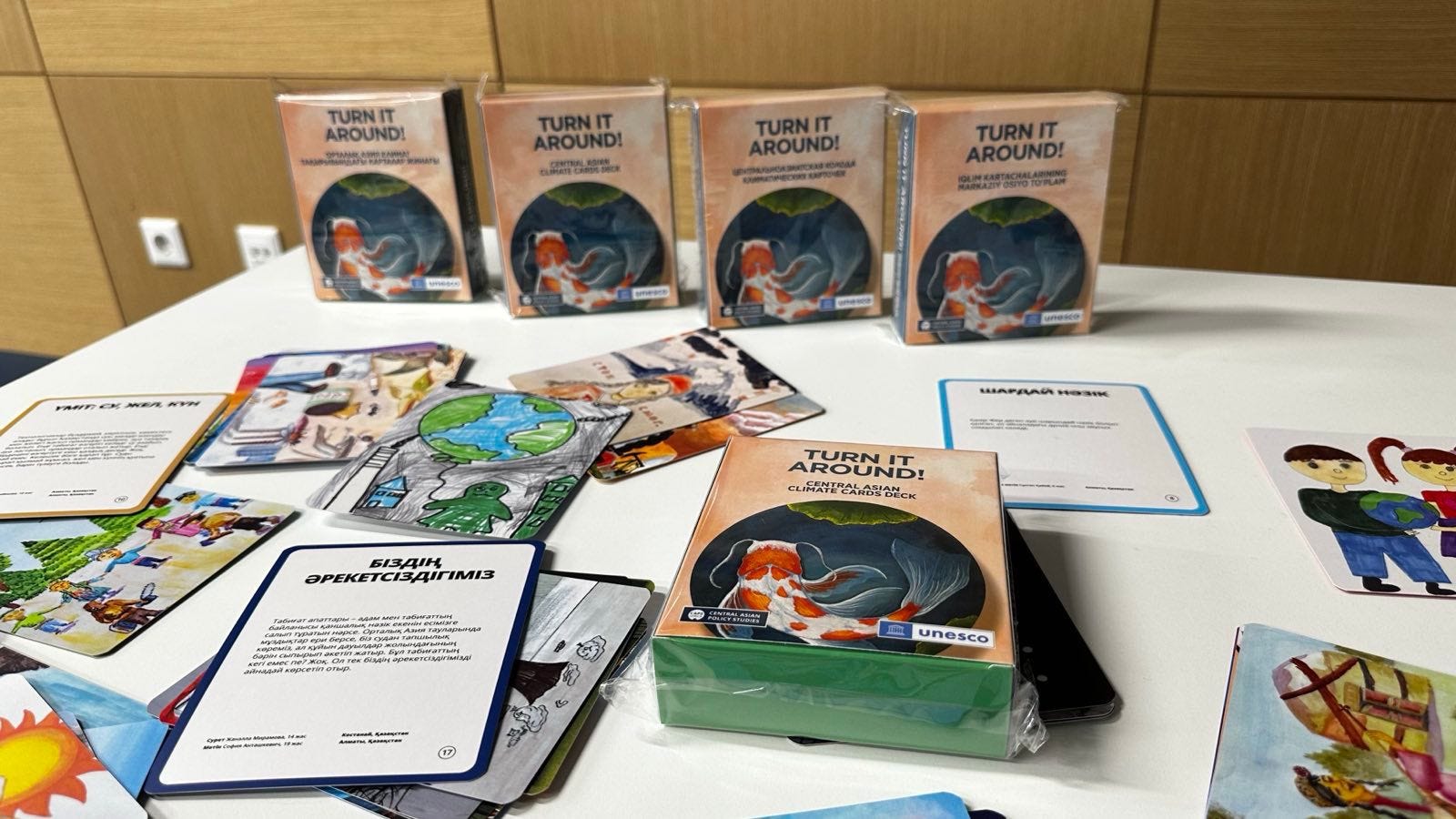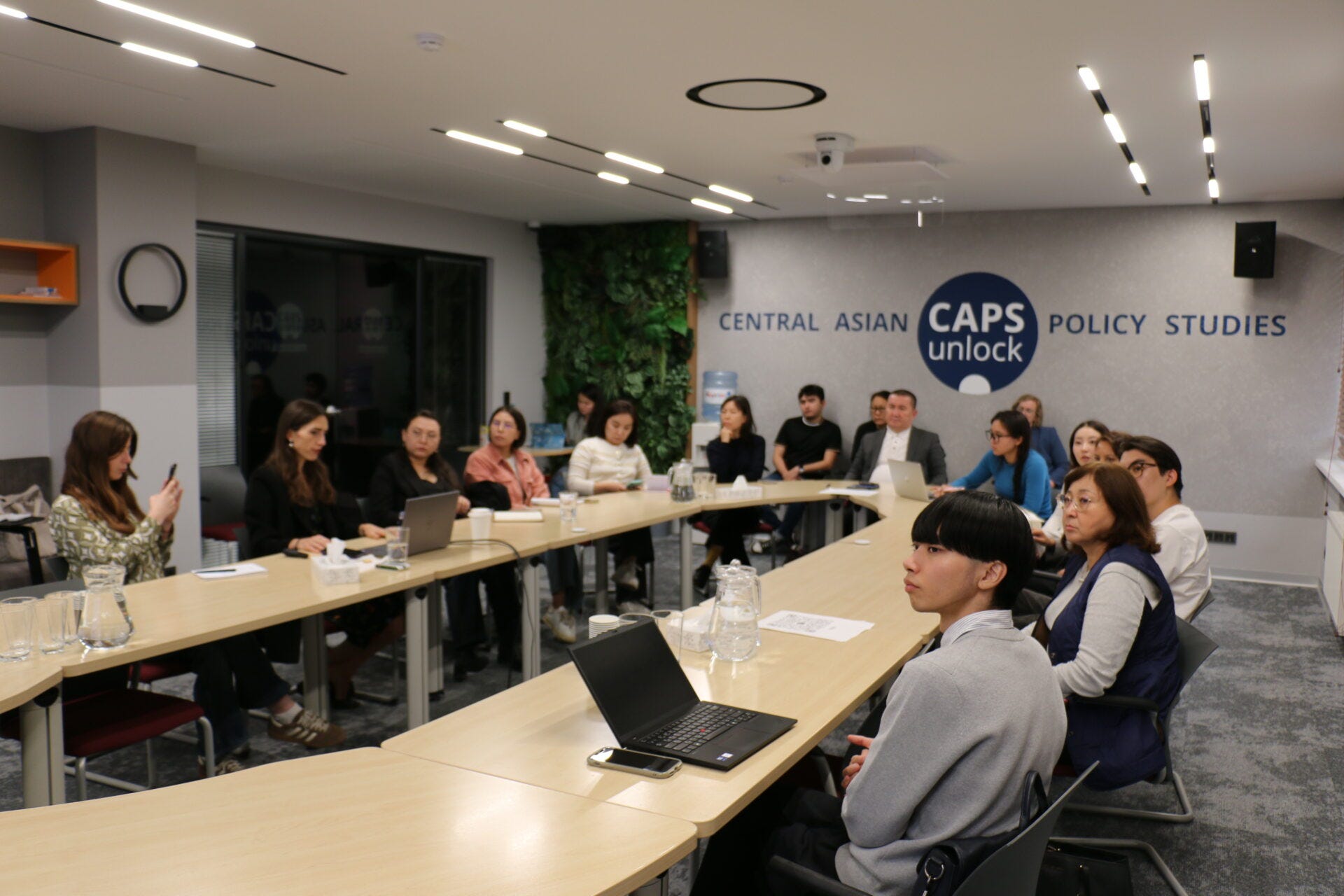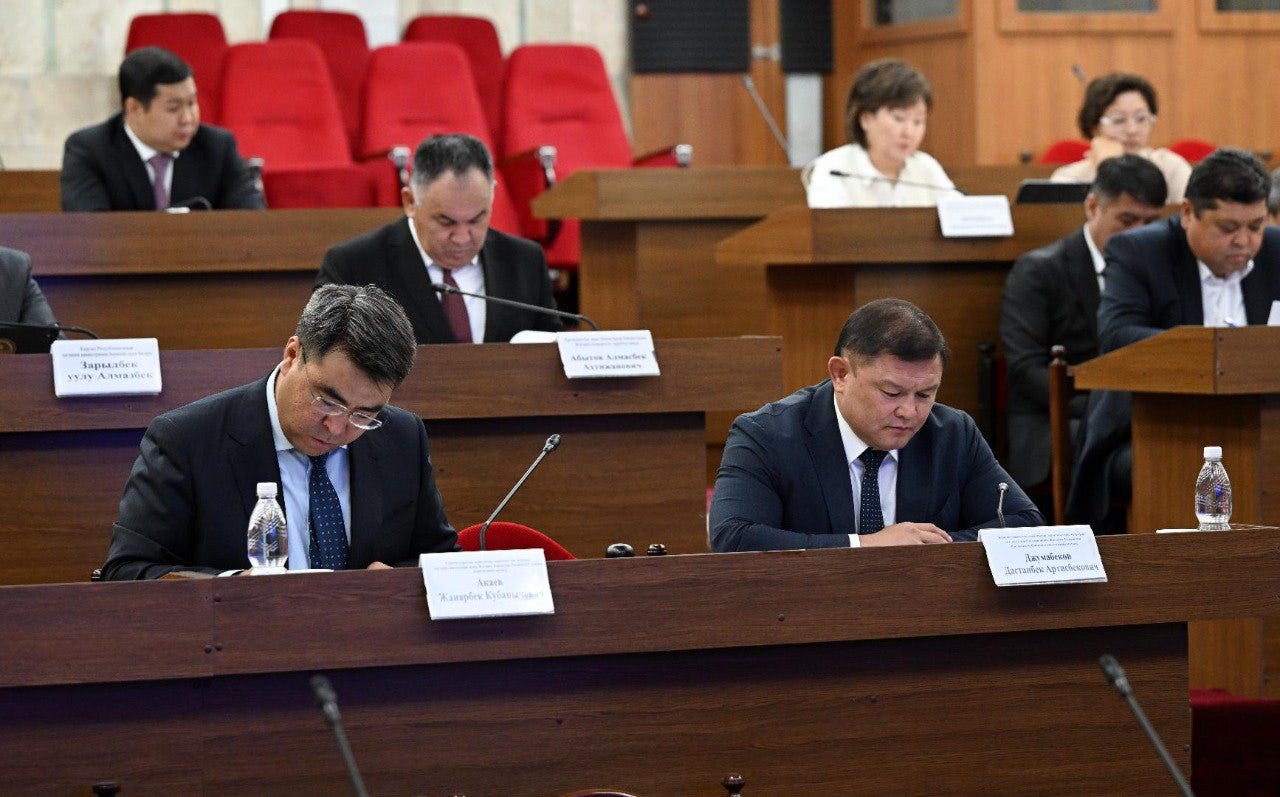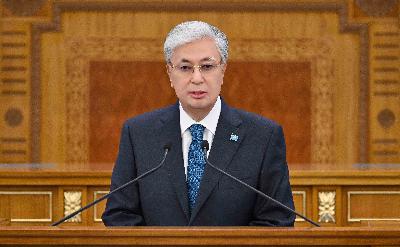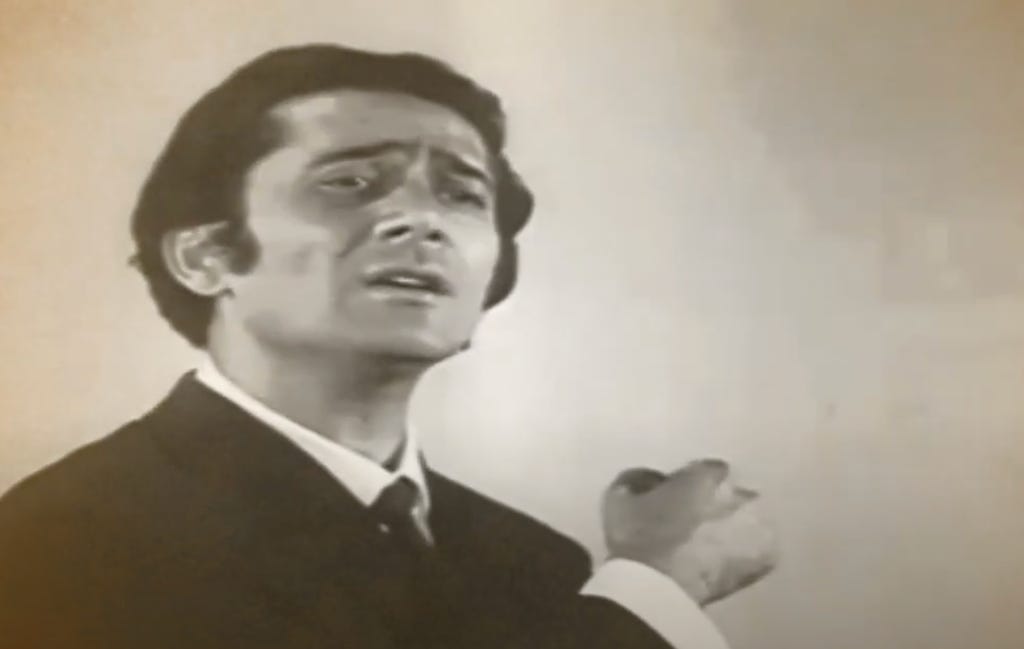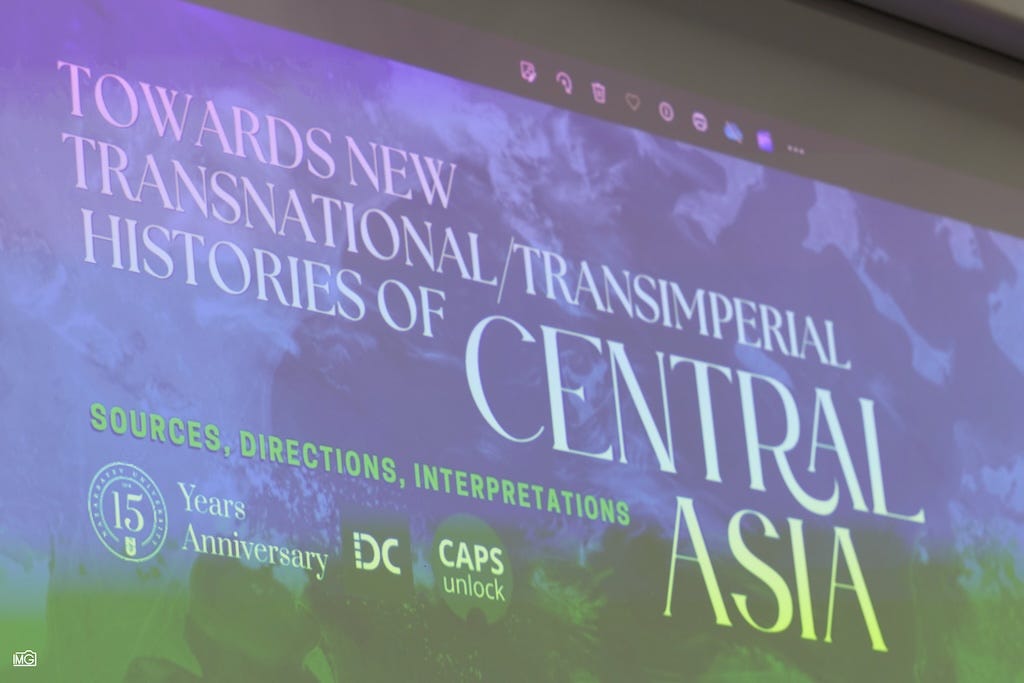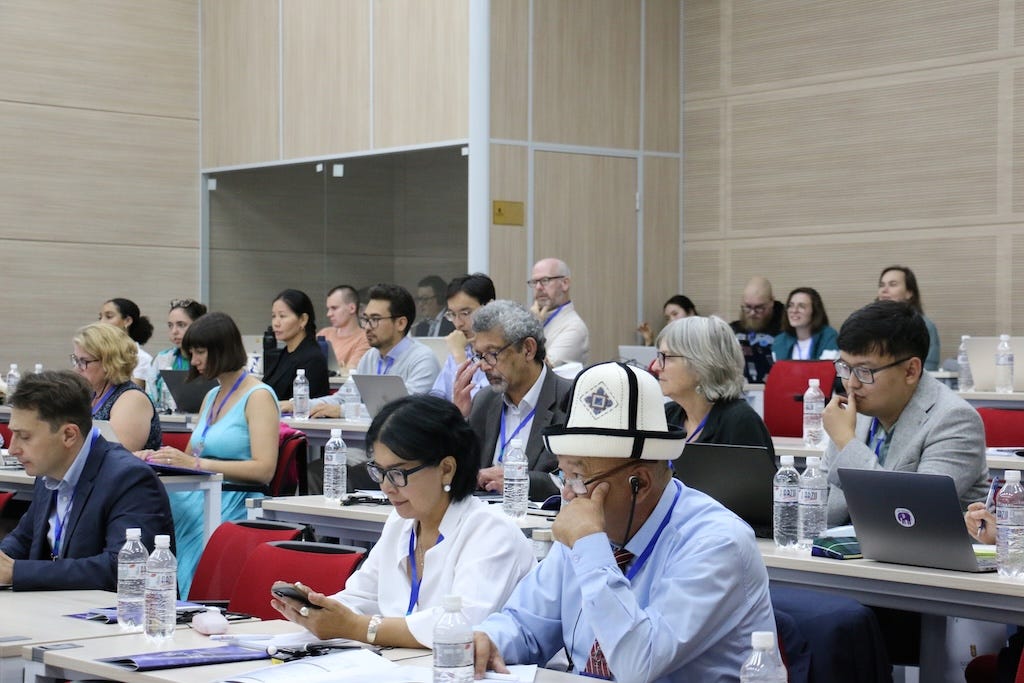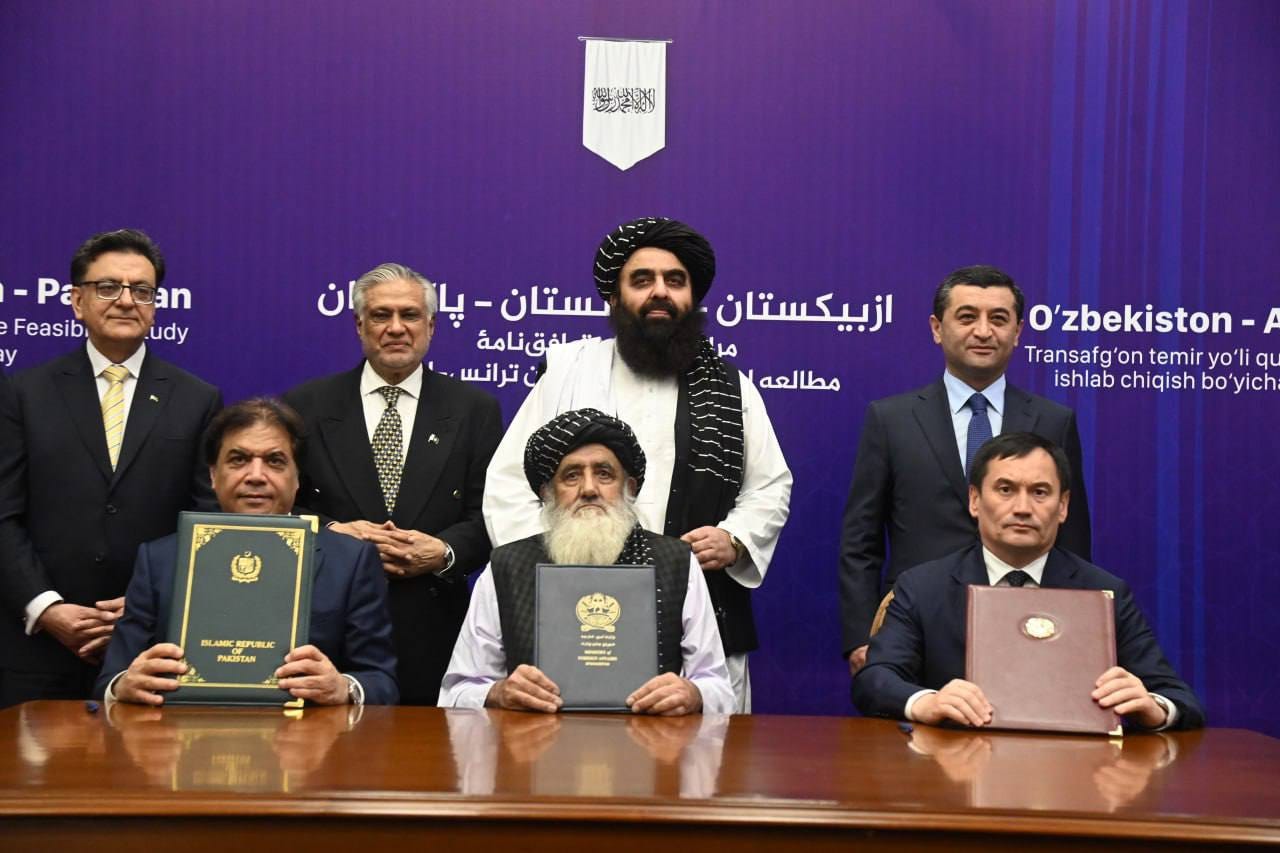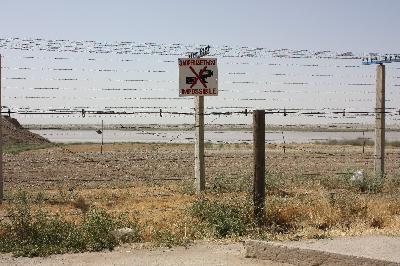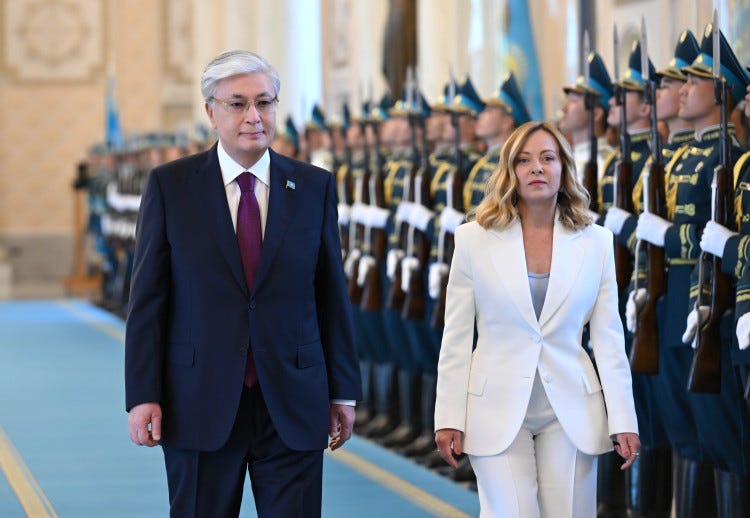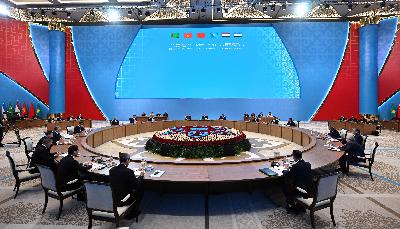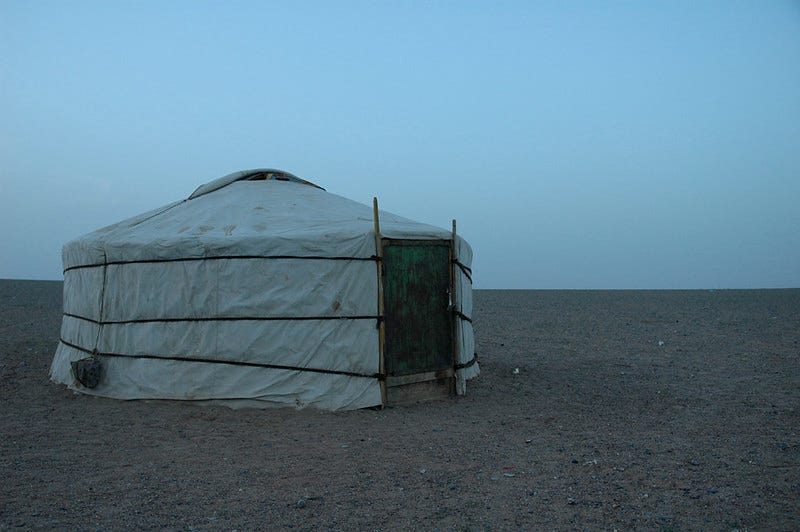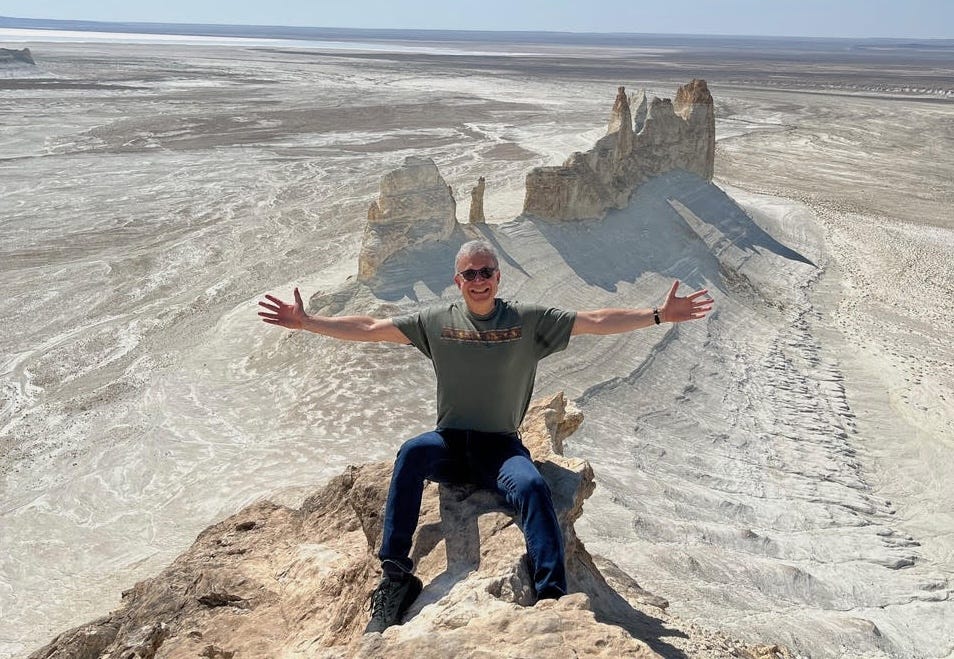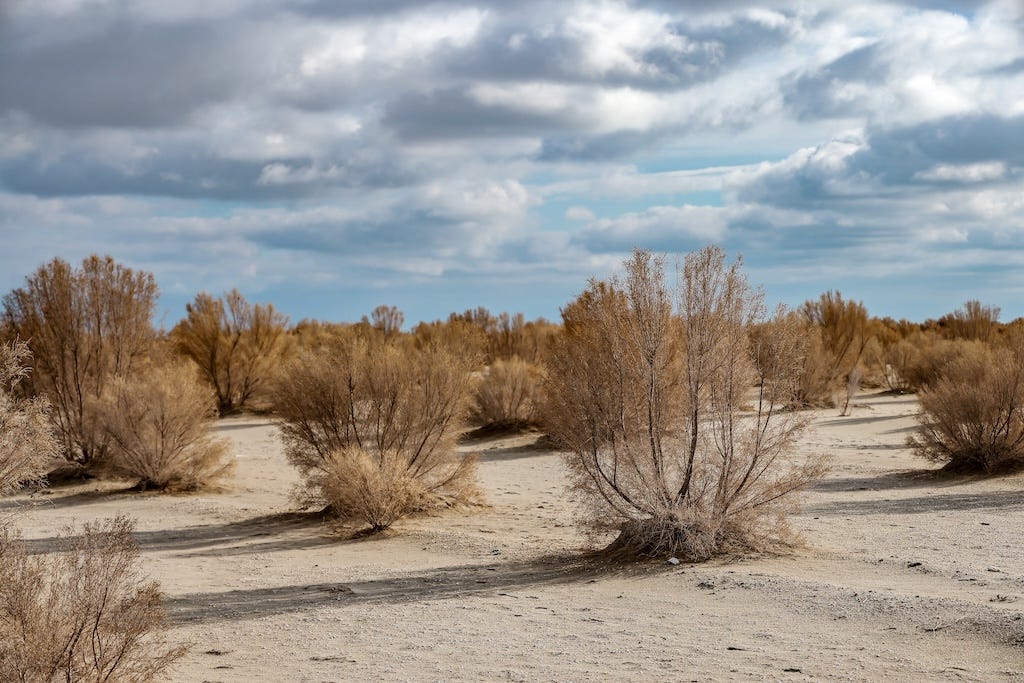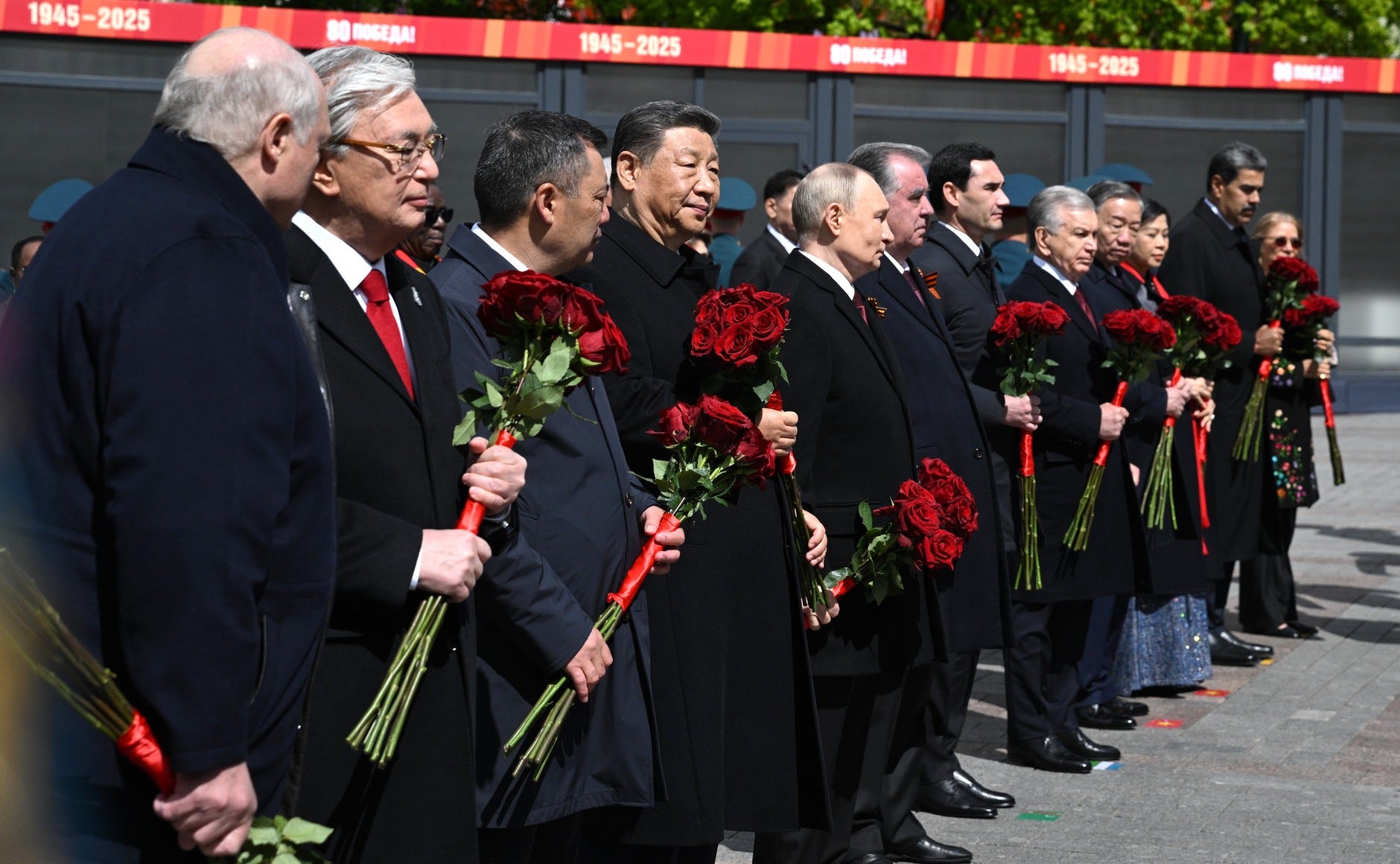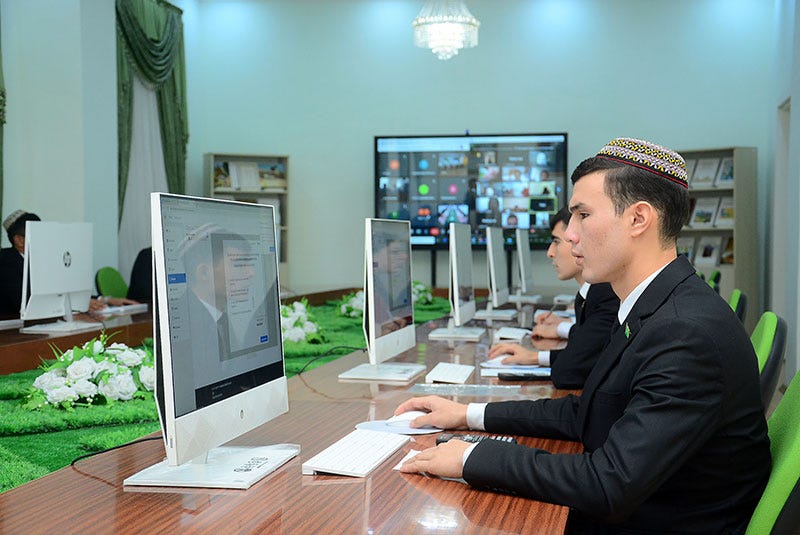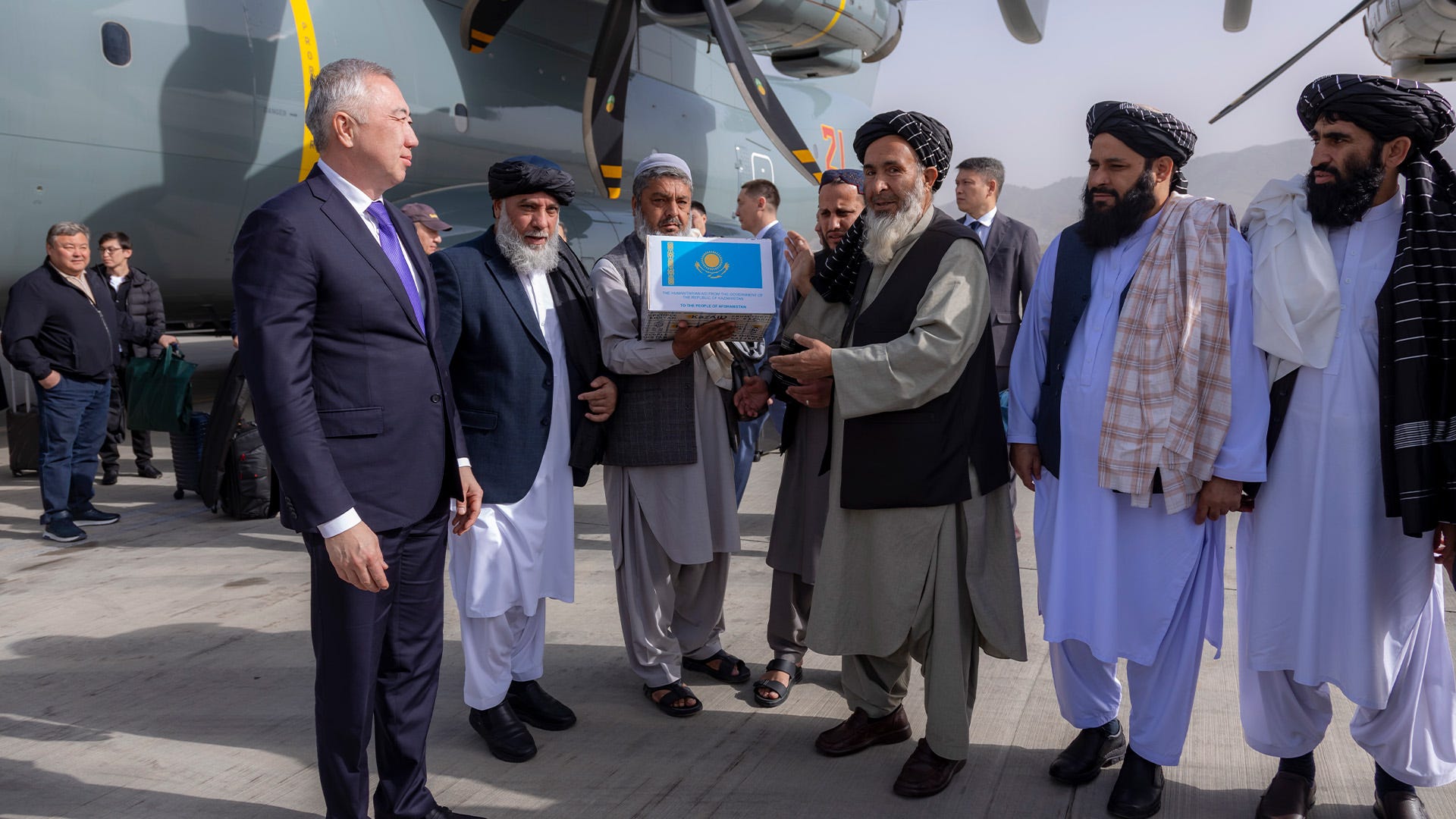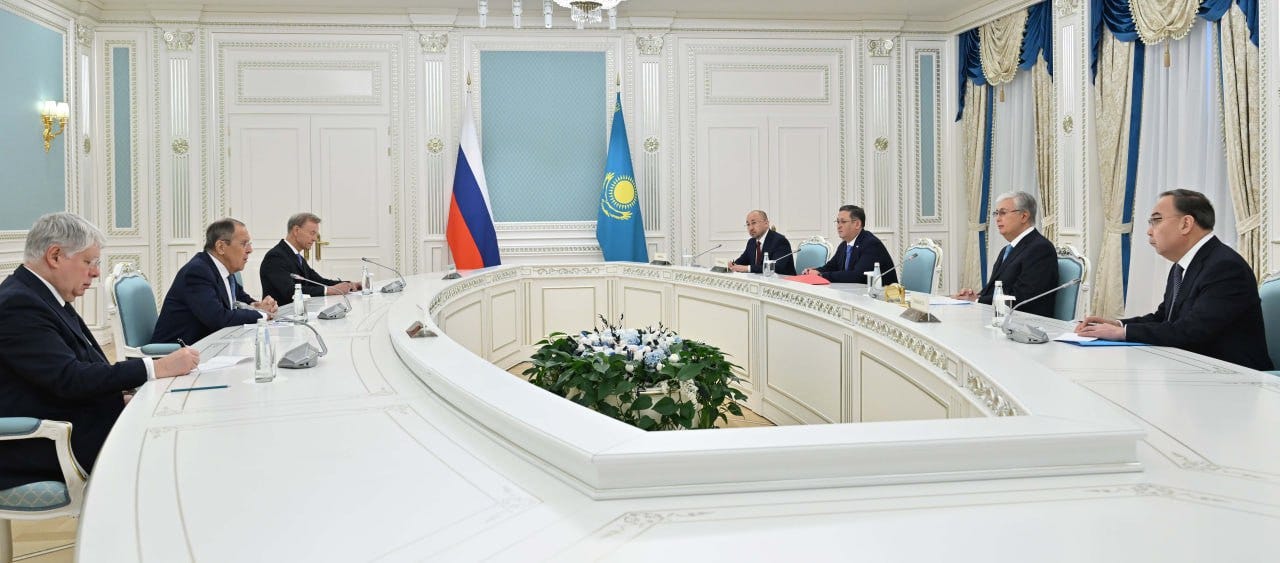Discover CAPS Unlock Podcast
CAPS Unlock Podcast

CAPS Unlock Podcast
Author: Peter Leonard
Subscribed: 10Played: 114Subscribe
Share
© Peter Leonard
Description
30 Episodes
Reverse
A sudden flare-up in Ukraine’s drone war has again rattled Central Asia’s energy nerves. This episode opens with a look at how Russian refinery shutdowns are rippling across the region. When the Novokuybyshevsk plant went offline after an October 19 strike, Kyrgyzstan and Tajikistan, which are both reliant on Russia for more than 90 percent of their fuel, were left scrambling. Petrol rationing in Bishkek and mounting anxiety among traders reveal just how vulnerable those supply chains remain. And with Kazakhstan freezing domestic fuel prices to contain inflation, even its neighbours can’t count on emergency help. What begins as a refinery fire in Samara ends up exposing the region’s deeper dependence on Moscow’s infrastructure.The episode’s centrepiece turns from crisis to creativity, featuring Marzhan Tajiyeva, Education Projects Coordinator at CAPS Unlock, on the launch of the Turn It Around! Central Asian Climate Cards, developed with UNESCO’s regional office. Created by young people from across six countries, the cards combine art and education to bring climate change into everyday lessons, in Kazakh, Kyrgyz, Tajik, Uzbek, Russian, and even English. Tajiyeva explains how a child’s drawing of the Aral Sea can spark empathy, critical thinking, and even policy reflection, turning students into messengers of shared responsibility. The project, part of a global initiative led by Arizona State University, now anchors a growing regional alliance for climate education.The final segment turns to football and politics. In Turkmenistan, the Asian Football Confederation has reportedly barred local clubs from hosting home games after inspectors condemned Arkadag’s flagship stadium, a supposed symbol of modernity, as unfit for play. The contrast with Almaty’s recent hosting of Real Madrid could hardly be sharper: FC Kairat’s Champions League adventure has become both a civic celebration and a study in political rehabilitation, as the club’s rise intertwines with the fortunes of its powerful backers. Even sport, it seems, can’t escape Central Asia’s habit of blending national pride with image-building and control.LINKS:CAPS Unlock statement on Turn It Around! Central Asian Climate Cards - https://capsunlock.org/news/caps-unlock-and-unesco-unveil-central-asian-climate-cards-to-bring-climate-change-into-classrooms/Fergana News report on Arkadag Stadium and AFC ban – https://fergana.agency/news/141688/Reuters reporting on Orenburg strike - https://www.reuters.com/world/europe/ukrainian-drones-cause-fire-russian-gas-plant-governor-says-2025-10-19/Symbol of Science journal paper portraying Arkadag FC as a showcase of Turkmenistan’s modernisation drive - https://cyberleninka.ru/article/n/arkadag-fc-turkmenistans-rapid-rise-in-football Get full access to Havli - A Central Asia Substack at havli.substack.com/subscribe
This week’s episode begins in Kyrgyzstan, where a brutal killing of a 17-year-old girl has reignited public fury and led President Sadyr Japarov to call for the return of the death penalty. The case has stirred intense debate about justice, morality, and political opportunism in a country that abolished executions nearly two decades ago. We look at how Japarov’s proposal both reflects and exploits public anger, and what it means for Kyrgyzstan’s already fragile constitutional order.The discussion later shifts to Kazakhstan, where President Kassym-Jomart Tokayev’s recent dismissal of global climate policy as a “massive fraud” clashes with his government’s simultaneous effort to market the country as a renewable-energy hub. At the recently concluded Kazakhstan Energy Week, ministers touted new wind and solar projects even as coal expansion and data-hungry AI ambitions deepen the country’s dependence on fossil fuels. We ask whether Tokayev’s rhetoric marks a populist pivot or a pragmatic recalibration around “energy sovereignty.”Our interview guest is Maria Adele Carrai, Assistant Professor of Global Chinese Studies at NYU Shanghai and co-director of Mapping Global China, an open-data platform that visualises Beijing’s global footprint. Carrai explains how the project uses satellite imagery and datasets to track China’s infrastructure, trade, and soft-power presence, from Kazakhstan to the Arctic, while inviting local researchers to contribute new “story maps.” She also discusses why portrayals of China as either a benign partner or a looming threat both miss the point.Useful links* Mapping Global China website – https://mapglobalchina.com/* CAPS Unlock event summary of Maria Adele Carrai lecture in Almaty - https://capsunlock.org/mapping-global-china-a-new-lens-on-beijings-reach-in-central-asia/* Kabar news agency interview with President Japarov - https://www.kabar.kg/news/el-menen-keneshebiz-prezident-olum-zhazasyn-kirgizuu-demilgesi-boyuncha-kommentariy-berdi/* TV report on President Tokayev’s speech to the National Council for Science and Technology - Get full access to Havli - A Central Asia Substack at havli.substack.com/subscribe
This week’s episode of the CAPS Unlock podcast begins with Kazakhstan’s ongoing fixation on artificial intelligence. Ever since President Kassym-Jomart Tokayev made AI the centrepiece of his State of the Nation address, ministries and agencies have scrambled to demonstrate their own contributions. A new ministry has been promised, AI education standards announced, and schemes for agriculture, public administration, and even ethics frameworks unveiled. The rhetoric is upbeat: Tokayev warns that failure to embrace AI would leave Kazakhstan economically and politically marginalized. But beneath the noise lie concerns about jobs and feasibility. Officials estimate up to 1 million positions could be affected. We look at the data to ask which sectors are most exposed, how automation and AI differ, and why public sector employment makes this such a politically charged issue.Our interview segment features Asel Mussagulova, lecturer at the University of Sydney and co-author of a new paper on Kazakhstan’s policy advisory systems. She explains how state-backed research institutes, directly funded and supervised by government bodies, almost inevitably reinforce official narratives and avoid criticism. Staffing choices, internal censorship, and oversight mechanisms mean their studies often legitimise decisions already taken. Yet Mussagulova also describes how financially independent research organisations, such as the emerging generation of private think tanks, can still offer more candid advice, sometimes by engaging public opinion or leveraging international connections. The picture that emerges is less monolithic than often assumed: authoritarian regimes seek legitimacy through research, but pockets of independence persist.We close with Kyrgyzstan, where parliament has (as of September 25, following our recording) dissolved itself, one year early. Deputies argue the move will streamline election timing by avoiding back-to-back parliamentary and presidential votes, while reforms to the electoral law promise greater gender representation and easier participation for citizens abroad. But by abolishing party lists in favour of hyperlocal constituencies, the reform strengthens district-level politics at the expense of national parties. In practice, this risks leaving Kyrgyzstan with a quieter, more compliant parliament, one shaped less by vigorous debate and more by presidential authority.Links* Mussagulova & Janenova, Management and Quality of Policy Advisory Systems in Kazakhstan: The Case of Public and Private Research Organizations (Policy and Society, 2025): https://academic.oup.com/policyandsociety/advance-article/doi/10.1093/polsoc/puaf025/8236331* IMF 2023 AI Preparedness Index (DataMapper): https://www.imf.org/external/datamapper/AI_PI@AIPI/ADVEC/EME/LIC* ILO study on AI and jobs: https://www.ilo.org/sites/default/files/2025-05/WP140_web.pdf* Acemoglu & Johnson, Power and Progress: Our Thousand-Year Struggle Over Technology and Prosperity (2023): https://www.amazon.com/Power-Progress-Thousand-Year-Technology-Prosperity/dp/1399804472 Get full access to Havli - A Central Asia Substack at havli.substack.com/subscribe
This week’s episode of the CAPS Unlock podcast opens with a discussion about a show of diplomatic unity in Central Asia. Following Israel’s strike on Qatar, all five governments of the region quickly issued statements of condemnation. Some went as far as calling the strike an act of aggression. We examine why these unusually swift and aligned reactions matter, how they highlight the region’s growing ties with Gulf states, and what they reveal about Central Asia’s selective application of principles such as territorial integrity.Our interview segment features Achille Jouberton, visiting scientist at the Swiss Federal Institute for Forest, Snow and Landscape Research, and lead author of a major new study on the glaciers of Tajikistan’s Pamirs. Long thought relatively stable compared to the shrinking ice fields of the Himalayas and Tien Shan, the Pamirs are now losing mass at troubling rates. Jouberton explains how declining snowfall since 2018, measured through field stations, pressure sensors, and climate reanalysis, is reshaping water availability in the region. He discusses the role of large-scale climate systems, the combination of less snow and hotter summers, and the downstream implications for agriculture and hydropower.We close by looking at President Kassym-Jomart Tokayev’s State of the Nation address in Kazakhstan. Among an eclectic mix of themes, including long passages on artificial intelligence, Tokayev floated the possibility of transforming Kazakhstan’s bicameral parliament into a single chamber. Though short on detail, the proposal hints at possible institutional re-engineering ahead of 2029, when Tokayev’s presidential mandate ends. We assess what this might mean for Kazakhstan’s political system and why even seemingly technical reforms can reshape the balance of power.Links:Snowfall decrease in recent years undermines glacier health and meltwater resources in the Northwestern Pamirs: https://www.nature.com/articles/s43247-025-02611-8Tokayev’s state of the union speech: https://www.akorda.kz/ru/poslanie-glavy-gosudarstva-kasym-zhomarta-tokaeva-narodu-kazahstana-kazahstan-v-epohu-iskusstvennogo-intellekta-aktualnye-zadachi-i-ih-resheniya-cherez-cifrovuyu-transformaciyu-885145 Get full access to Havli - A Central Asia Substack at havli.substack.com/subscribe
In the third and final instalment of podcasts recorded on the sidelines of a major history conference at Nazarbayev University, the CAPS Unlock podcast looks at how culture grows under pressure. We speak to Irina Sinepupova (a historical researcher currently pursuing her studies at Nazarbayev University) and Leora Eisenberg (PhD candidate, Harvard University) about two very different cases that expose the same paradox: culture was steered by the state, yet the results often felt vivid and genuine.Sinepupova walked us through the mechanics of Soviet literary censorship in Kazakhstan. GLAVLIT’s republican branches, she explains, were formally subordinate to Moscow but in practice leaned on local party organs. Manuscripts usually arrived “distilled” by publishing houses and writers’ unions, where criticism could be harsher than at the censorship desk. Censors looked not only for political deviations but also for “artistic quality,” an unexpected criterion written into instructions she found in archival files in Almaty. Language mattered too: a scarcity of Kazakh-language specialists created gaps, and writers often marked texts’ Kazakhness to signal origins even in Russian editions. The broader picture is one of instability and negotiation rather than a monolith: those who learned to “speak Bolshevik” could often navigate the system.Eisenberg spoke to us about Uzbek estrada, a lighter, stage-oriented popular genre that took off after Stalin. She traces why it leaned so heavily on repertoire from the “foreign East” while using European orchestration. First, heavy “big-form” European genres failed to connect with local audiences or produce enough Uzbek graduates from conservatories, so estrada served as an accessible bridge. Second, Cold War politics: Tashkent hosted Afro-Asian cultural events and film festivals, so performers who could sing Arabic, Hindi, Persian and more became cultural mediators for visiting delegations. Third, hybridity carried an ideological charge: European-style arrangements showcased Soviet modernity, while Eastern repertoires made the music legible to international audiences. Names to explore include Batyr Zakirov (notably his “Arabic Tango”), Muhabbat Shamaeva, Rano Sharipova, Stakhan Rahimov, and Elmira Urazbayeva.Together, these cases suggest that Soviet cultural life in Central Asia was less about top-down diktat than about constant bargaining among censors, unions, publishers, performers and audiences. Control set the frame; creativity filled it in surprising ways.CAPS Unlock extends immense gratitude to Professor Mikhail Akulov, Medina Kerimberdiyeva, and the Nazarbayev University student volunteers who made both the conference and this podcast possible. Get full access to Havli - A Central Asia Substack at havli.substack.com/subscribe
This week we continue a special series recorded on the sidelines of the international conference Toward New Transnational/Transimperial Histories of Central Asia: Sources, Directions, Interpretations, held at Nazarbayev University in Astana in August. This week we’re looking at what comes after the “nation-making” narrative and how historians are reframing the region through transnational and trans-imperial lenses.We speak to Adeeb Khalid (Carleton College), Adrienne Edgar (UC Santa Barbara), and Javeed Ahwar (Nazarbayev University). The conversation begins by dismantling a familiar myth that Lenin and Stalin casually drew Central Asia’s borders in late-night sessions. Instead, borders emerged from protracted bargaining between Moscow and local elites. The guests argue that while much of the nation-building story has been mapped, the field is not “finished”; it is widening to examine flows of people, ideas, and commerce that exceed state lines.Ahwar probes those written out of tidy national narratives, from Sarts to tribal identities folded into broader categories. He cautions that scholarship can unintentionally reinforce nationalism and urges more inclusive frames that acknowledge internal diversity. Edgar situates the Soviet period within a global wave of interwar nation formation, noting that nation-states might have arisen regardless, though not necessarily in the exact Soviet configuration. Khalid underscores a broader point: all nations are constructed, and in Central Asia the scaffolding is simply more visible.Where next? The guests point to two frontiers. First, reassessing transnational Soviet projects such as “friendship of peoples,” civic Sovietness, and internationalism. Second, thinking beyond the five-republic box to long-standing connections with Xinjiang, Afghanistan, and the Indian subcontinent, and to cross-pollination among major intellectual figures. The aim is a history that tracks mobility, cosmopolitanism, and overlapping imperia alongside nations.CAPS Unlock extends immense gratitude to Professor Mikhail Akulov, Medina Kerimberdiyeva, and the Nazarbayev University student volunteers who made both the conference and this podcast possible. Get full access to Havli - A Central Asia Substack at havli.substack.com/subscribe
In this episode of the CAPS Unlock podcast we temporarily step away from our usual format for the first in a short series recorded on the sidelines of the international conference, Toward New Transnational/Transimperial Histories of Central Asia: Sources, Directions, Interpretations, which took place at Nazarbayev University in Astana, Kazakhstan, on August 20–22.We speak to Roman Osharov, a DPhil candidate at the University of Oxford whose work examines how the Russian Empire produced knowledge about Central Asia in the nineteenth century; Daniel Scarborough, Associate Professor of Russian History and Religion at Nazarbayev University; and Gavin Slade, Associate Professor of Sociology at Nazarbayev University and co-lead of the Central Asia’s Gulag project.The conversation centred on the nuts and bolts of doing history from the archives. We discuss how access varies across the region; the relative ease of Kazakhstan (with longer lead times and embassy paperwork), the difficulty and unpredictability of Uzbekistan’s main historical archive in Tashkent, and the near-impossibility of working in Turkmenistan, and why professional conduct in reading rooms matters for everyone’s access. Our guests offer pragmatic advice for younger researchers: start with national libraries and home-institution holdings; learn (and use) non-Russian languages where possible; and plan for multi-month stints once you do enter archives.We also look beyond the archive. Slade explained how archaeological survey, mapping, museum studies, and oral history can “triangulate” fragmentary files on sites like Karlag (one of the largest Gulag labour camp systems in the Soviet Union, located in central Kazakhstan) yielding grounded insights into camp layouts, daily labour, and living memory in former Gulag villages. Scarborough reflects on the dominance of Russian-language materials and ways to recover Central Asian voices; Osharov describes manuscript collections and periodicals in Persian and Turkic that can rebalance the record, and the challenge of doing so while working within “Russian history” as a field.We close on the state of play: a moment of opportunity in Kazakhstan (and, to a degree, Kyrgyzstan), tempered by fragility elsewhere, and a gentle plea to researchers not to jeopardise that access.Stay tuned for more conversations from the Toward New Transnational/Transimperial Histories of Central Asia conference in coming episodes. Get full access to Havli - A Central Asia Substack at havli.substack.com/subscribe
In this week’s episode of the CAPS Unlock podcast, we break with our usual format to bring you a wide-ranging long-form conversation with Bruce Pannier, veteran Central Asia watcher and a newly minted Research Fellow at the Yorktown Institute’s Turan Research Center.Pannier reflects on three decades of reporting and analysis, from his early days gathering scraps of information in the pre-internet 1990s to today’s denser, more contested media landscape.We explore how both Central Asian regimes and audiences have changed over time, the new sophistication of state information control, and the shifting boundaries of censorship, especially in Kyrgyzstan and Uzbekistan.We also examine how growing geopolitical autonomy, deepening partnerships with Gulf states and China, and a rising standard of living shape domestic politics.Finally, we look to the future: Will Central Asia become more technocratic, more pious, or both? And what happens when tomorrow’s leaders know both global capitalism and the Quran? It’s a candid, thoughtful exchange with someone who has seen it all. Get full access to Havli - A Central Asia Substack at havli.substack.com/subscribe
This week’s episode of the CAPS Unlock podcast takes us from the heat-blasted plains of Turkmenistan to the mineral riches of Kazakhstan and Uzbekistan, and then to end, back to Bishkek’s street theatre of power.We begin with a dive into the mooted trans-Afghan railway, a project once seen as fantasy that now edges closer to reality. We discuss Uzbekistan, Pakistan, and Afghanistan’s newly signed agreement to launch feasibility studies for the 700-kilometre route. Could this long-touted project finally break Uzbekistan out of its geographic deadlock, or will questions over security, financing, and the Taliban’s international status keep it grounded?In our interview segment, we speak with Roman Vakulchuk, head of the Climate and Energy Research Group at the Norwegian Institute of International Affairs. Vakulchuk talks us through his new paper on the European Union’s cooperation with Central Asia on critical raw materials. Despite high-level rhetoric and investment pledges under the Global Gateway, the EU lags behind China and the U.S. in concrete deals. Vakulchuk explores why, and outlines the small, smart policy moves Brussels could make to regain ground, starting with visa reform.We close with a character study of Kamchybek Tashiyev, head of Kyrgyzstan’s security services, who once again made headlines by publicly dressing down a city official over a fenced-off plot of land. Was it law enforcement, political theatre, or both? We examine how Kyrgyz power now plays out not in parliament, but on camera, and what that says about elite dynamics across the region.Useful links:Start Slow to Go Fast? Unlocking EU–Central Asia Cooperation on Critical Materials https://library.fes.de/pdf-files/bueros/bruessel/22082.pdfThe other president of Kyrgyzstan: https://havli.substack.com/p/the-other-president-of-kyrgyzstan Get full access to Havli - A Central Asia Substack at havli.substack.com/subscribe
This week on the CAPS Unlock podcast, we explore a consolidating trend that could redefine Central Asia’s place on the map, not just as a post-Soviet periphery, but as a key connector to South Asia and beyond.But we open with a dispatch about CAPS Unlock activities Astana, where we just wrapped up a rule-of-law training for young professionals.Then, attention turns southward. First to a Russia–Uzbekistan business forum in Novosibirsk, where Russia made a play to reinsert itself into Afghan-bound trade, and then to Termez, the Uzbek city now at the heart of a regional reimagination.In our interview segment, we speak to Eldaniz Gusseinov, a Kazakh expert on regional politics and non-resident research fellow at the Haydar Aliyev Center for Eurasian Studies. Gusseinov unpacks the significance of the Termez Dialogue, a quiet but ambitious platform aimed at boosting Central–South Asian connectivity. He discusses how countries like Uzbekistan and Kazakhstan are positioning themselves as middle powers by investing in Afghan trade routes and infrastructure, even amid regional volatility and Taliban realpolitik.Finally, we examine U.S.–Kazakhstan tensions after President Donald Trump’s announcement of 25 percent tariffs on Kazakh exports. Despite what may be minimal economic impact (although this is uncertain), the move sends confused signals about Washington’s Central Asia policy, particularly after recent diplomatic overtures. We weigh the symbolism, the snub, and what Kazakhstan’s mild-mannered response reveals.Useful links:CAPS Unlock Instagram account: https://www.instagram.com/capsunlock_org/Kazakhstan reacts to Trump tariff threats: https://www.reuters.com/world/asia-pacific/kazakhstans-leader-tells-trump-that-he-hopes-compromise-new-us-tariffs-2025-07-10/Report on Uzbek-Russian business forum in Novosibirsk (Russian): https://asia24.media/news/v-novosibirske-proshel-pervyy-biznes-forum-s-uchastiem-predstaviteley-uzbekistana-i-sibiri/Op-ed on Termez Dialogue written by Uzbek government official: https://www.euronews.com/2025/05/21/termez-dialogue-in-search-of-a-new-paradigm-for-central-and-south-asian-relations Get full access to Havli - A Central Asia Substack at havli.substack.com/subscribe
This week we are looking at three very different but equally revealing stories from across Central Asia.First, we begin in Kyrgyzstan, where parliament passed a new law banning the online distribution of pornographic content. On the face of it, this may seem like a niche issue, but it speaks volumes about the evolving moral agenda of President Sadyr Japarov’s administration. Although proponents claim the law will uphold national values and protect youth, critics argue it is largely symbolic, and easily circumvented with VPNs. Later, we turn to climate change, and in particular, a sobering new World Bank report titled Unlivable: How Heat is Reshaping Cities in Europe and Central Asia. The report warns of rising death tolls, falling labour productivity, and overwhelmed healthcare systems as heat stress intensifies across the region. But it also offers hope, so long as authorities act thoughtfully through tree-planting, housing upgrades, and local governance reform. We explore what solutions are on the table and whether Central Asia’s institutions are agile enough to act on them in time.In our interview segment, we speak with Marco Beretta, president of the Italian-Kazakh Trade Association. Beretta shares insights into how Italy’s deepening commercial relationship with Kazakhstan is expanding beyond hydrocarbons. He discusses emerging investment in biofuels, sustainable aviation fuel, and small-to-medium enterprises. We also reflect on the significance of Italian PM Giorgia Meloni’s visit to Astana in May and what it revealed about European strategic interests in the so-called Middle Corridor.Suggested readingUnlivable: How Cities in Europe and Central Asia Can Survive and Thrive in a Hotter Future https://www.worldbank.org/en/region/eca/publication/unlivable-how-cities-in-europe-and-central-asia-can-survive-and-thrive-in-a-hotter-futureCentral Asia Barometer research on domestic violence and online content https://ca-barometer.org/assets/files/froala/207fb9867dee0c7a6e8f0968e4cd2acd4a16895d.pdf Get full access to Havli - A Central Asia Substack at havli.substack.com/subscribe
This week, we focus on one major theme: China’s evolving relationship with Central Asia. The episode centres on the China–Central Asia summit held last week in Astana and features an extended interview with Temur Umarov, a fellow at the Carnegie Russia Eurasia Center and a leading expert on China’s role in the region.We unpack what’s new and what’s not in Beijing’s outreach, from 35 percent trade growth since the last summit to Xi Jinping’s pledges of 3,000 training spots and 1.5 billion yuan in “livelihood projects.” The episode explores the deeper story behind the formal rhetoric; particularly the establishment of a China–Central Asia secretariat and the signing of a Treaty of Eternal Good-Neighbourliness.The conversation takes a critical look at how much Central Asia is shaping this agenda versus simply reacting to it. While elites increasingly articulate their own wish lists (such as Tajikistan’s call for green AI infrastructure), Umarov argues that meaningful local agency is more visible behind the scenes, including through protest dynamics and elite negotiation.We also discuss China’s soft power strategy, shifts in public attitudes, and the dangers of dependency, especially in the digital realm. As Chinese infrastructure projects gain speed across the region, questions about transparency, workforce inclusion, and long-term sovereignty loom large.In sum, this episode asks: Is Central Asia becoming a corridor, or a partner? And can it remain a free agent in a world of increasingly strategic patrons?Useful links:CAPS Unlock & Internet Society, Kazakhstan’s Internet Landscape: Understanding Threats and Opportunitieshttps://capsunlock.org/publications/kazakhstan-internet-landscape-understanding-threats-and-opportunities/Berikbol Dukeyev, How Local Realities Compelled China to Adapt Its Soft-Power Strategy in Kazakhstanhttps://carnegieendowment.org/posts/2024/09/kazakhstan-china-soft-power-adaptation?lang=enOxus Society Protest Trackerhttps://oxussociety.org/viz/protest-tracker/Odil Gafarov, Boots on the Ground: What Chinese Private Security Contractors Do in Central Asiahttps://carnegieendowment.org/posts/2024/07/china-private-security-central-asia?lang=enMinning Town (Chinese rural development drama referenced by Xi Jinping)World Bank, Country Economic Memorandum 2025: Kyrgyz Republichttps://www.worldbank.org/en/country/kyrgyzrepublic/publication/cem-2025 Get full access to Havli - A Central Asia Substack at havli.substack.com/subscribe
This week’s CAPS Unlock takes us east, to a country often left out of Central Asia’s story: Mongolia. We speak to Chimguundari Navaan-Yunden, a former advisor to the Mongolian prime minister, about her recent article exploring Mongolia’s foreign policy realignment toward Central Asia.From efforts to expand rail and trade links, to high-level diplomacy and civic vibrancy, Mongolia offers a sharp contrast to its authoritarian neighbours.And CAPS Unlock program coordinator Tlegen Kuandykov shares fresh impressions from his first visit to Mongolia and reflects on the political and cultural commonalities (and differences) that shape the Greater Central Asia debate.Links:Mongolia’s Pivot to Central Asia and the Caucasus: Strategic Realignments and Regional Implications: https://www.cacianalyst.org/publications/analytical-articles/item/13871-mongolia%E2%80%99s-pivot-to-central-asia-and-the-caucasus-strategic-realignments-and-regional-implications.htmlFreedom in the World 2025: https://freedomhouse.org/report/freedom-world/2025/uphill-battle-to-safeguard-rights Get full access to Havli - A Central Asia Substack at havli.substack.com/subscribe
This week, an unusual edition of the CAPS Unlock podcast. I speak to Daniel Rosenblum, the recently retired U.S. ambassador to both Uzbekistan and Kazakhstan, about his decades-long engagement with Central Asia and the future of U.S. foreign policy in the region.We begin with Rosenblum’s personal journey, shaped by his family’s early activism for Soviet Jewry, and trace his career through labour union work, U.S. foreign assistance partnerships, and ultimately diplomacy. He reflects on the enduring goals of U.S. policy in Central Asia and the tensions between supporting democratic governance and engaging in hard-headed security cooperation.We also talk about the long arc of independence in Central Asia: how countries like Kazakhstan have learned to walk a diplomatic tightrope between great powers, why Uzbekistan’s reforms remain significant despite backsliding, and whether the West sometimes judges the region too harshly. Finally, Rosenblum shares his views on the dismantling of USAID under the Trump administration and what might be lost if the U.S. abandons its development commitments. Get full access to Havli - A Central Asia Substack at havli.substack.com/subscribe
This week’s episode opens with a conversation about an intensifying environmental threat in Central Asia: sand and dust storms. A major storm hit Tashkent last week, felling trees, halting flights, and triggering dangerous air pollution levels. The discussion explores long-term drivers of this trend, from climate change and Aral Sea degradation to unchecked urban construction. We examine how countries like Uzbekistan are responding with national greening strategies, and where political will may be falling short.In a second segment, we turn to Uzbekistan’s push to become a tourism hotspot. A new presidential decree aims to attract 16 million foreign visitors by the end of 2025. The episode discusses how this is being pursued through visa liberalisation, promotion campaigns, and even new “tourist villages.” But questions remain about whether the growth model is too top-down, and whether domestic tourism can be part of the solution.This week’s interview features Callum Voge, director of Governmental Affairs and Advocacy, and Amreesh Phokeer, Internet Measurement and Data Expert, both from the Internet Society. We discuss a new report that they produced in collaboration with CAPS Unlock on Kazakhstan’s digital infrastructure and internet vulnerabilities. Topics include the country’s high telecom concentration, reliance on Russian infrastructure, surveillance capabilities such as root certificate programs, and the promise (and risks) of new routing alternatives through the Caspian and China. The guests also assess what true resilience would look like, and why decentralisation matters for both privacy and economic growth.Useful readingUNCCD: Regional Strategy for Sand and Dust Storms in Central Asia https://www.unccd.int/sites/default/files/2022-10/Regional%20strategy_SDS_%D0%B0%D0%BD%D0%B3%D0%BB_print.pdfBringing life back to Central Asia's desertified Aral Sea (Deutsche Welle) https://www.dw.com/en/the-aral-sea-from-lake-to-desert-to-forest/a-70987224 Get full access to Havli - A Central Asia Substack at havli.substack.com/subscribe
This week’s episode opens with a look at Kazakhstan’s oil production surge and the geopolitical and economic ramifications of the country’s deviation from OPEC+ production quotas. Despite a formal commitment to restraint, Kazakhstan reached record-breaking oil output in March and remained well above quota in May. The discussion considers whether the move reflects nervousness in Astana about slowing GDP growth and growing public discontent over inflation, as captured in a recent report by United Research Technologies Group. The report highlights a gap between official narratives and lived experience, suggesting that the government may be prioritising short-term fiscal relief through oil sales, even at the risk of undermining cartel solidarity.In a second segment, we explore a newly published academic paper, titled Bumps Along the Golden Road: Unpacking Sinophobic Sentiments in Central Asia, 2002–2023. The paper draws on protest data, survey results, and dozens of interviews to argue that anti-China sentiment has been steadily rising across the region. Kazakhstan and Kyrgyzstan remain focal points for street protests, while Uzbekistan’s xenophobic discourse is increasingly expressed via social media. But the episode also raises questions about how far these attitudes are generalisable, and how much they may reflect temporary surges of online outrage rather than structural geopolitical mistrust.In this week’s interview, we speak with Merete Looft, a campaigner at environmental NGO Urgewald, about Kazakhstan’s potential inclusion in the Asian Development Bank’s Energy Transition Mechanism. Looft explains how the ETM seeks to retire coal plants early in favour of renewable energy, but she warns that without stricter safeguards, it risks funnelling money to fossil fuel firms with expansionist agendas. Drawing on Urgewald’s own research and coal industry tracking tools, she outlines what activists are watching for as feasibility studies proceed, and what a truly just transition should look like.Useful links• Central Asia Barometer research on attitudes toward China - https://capsunlock.org/publications/beyond-the-silk-road-navigating-the-complexities-of-central-asias-public-opinion-on-china/• United Research Technologies Group report on economic sentiment in Kazakhstan (in Russian) - https://urtg.org/research-result/indikator-ekonomicheskih-nastroenij-kazahstana-maj-2025/• Urgewald’s critique of the ADB’s Energy Transition Mechanism - https://www.urgewald.org/sites/default/files/media-files/urgewald_ADB_ETM_Paper.pdf• Europe-Asia Studies article: Bumps Along the Belt and Road - https://www.tandfonline.com/doi/full/10.1080/09668136.2025.2486300?src=exp-la• Book: Backlash: China’s Struggle for Influence in Central Asia, by Bradley Jardine and Edward Lemon - https://www.hurstpublishers.com/book/backlash/• Gazeta.uz article about wave of anti-Chinese sentiment online - https://www.gazeta.uz/ru/2025/03/11/china-uzbekistan/ Get full access to Havli - A Central Asia Substack at havli.substack.com/subscribe
This week’s episode opens with reflections on Victory Day, observed annually on May. This year marked the 80th anniversary of the Allied victory in World War II, and once again the leaders of all five Central Asian republics attended Moscow’s parade. Yet beneath the rituals of state ceremony lie increasingly contested memories and shifting sentiments. The discussion draws on historian Vicky Davis’ book Central Asia and World War Two, which documents not only the human cost of the war in the region, but the systemic discrimination faced by Central Asian soldiers within the Red Army. In Kazakhstan and elsewhere, the official narrative is under pressure. While many continue to view the day as one of solemn remembrance, the war’s politicization, especially in light of Russia’s current conflict in Ukraine, is sparking discomfort, quiet resistance, and attempts to nationalise the commemorative agenda.The episode also turns to a notable development in regional fintech. Kyrgyzstan has announced a partnership with Binance, the world’s largest cryptocurrency exchange, to jointly develop a national digital currency system. The centrepiece of this collaboration is the “Gold Dollar” (USDKG), a new stablecoin backed by both US dollar reserves and physical gold held by Kyrgyzstan’s Ministry of Finance. The project positions Kyrgyzstan as a nimble actor in the evolving digital economy and raises important questions about remittances, regulation, and sovereignty in financial infrastructure.In this week’s interview, we speak with Sophie Ibbotson, the author of a newly released Bradt guidebook to Uzbekistan. The conversation covers her long-standing relationship with the country, the risks of overtourism and “disneyfication,” and why lesser-known regions like Termez and the Fergana Valley deserve more attention from travellers.Useful links* Central Asia and World War Two by Vicky Davis: https://www.bloomsbury.com/us/central-asia-in-world-war-two-9781350372306/* Economist article on stablecoins: https://www.economist.com/finance-and-economics/2025/02/23/stablecoins-the-real-crypto-craze* Bradt Travel Guide to Uzbekistan: https://www.bradtguides.com/product/uzbekistan Get full access to Havli - A Central Asia Substack at havli.substack.com/subscribe
This week’s episode opens with a look at an intriguing, if vague, agreement between Uzbekistan and Afghanistan to jointly manage the Amu Darya river basin. Though details remain scarce, the deal suggests a growing willingness by both countries to cooperate on the region’s most urgent environmental and water management challenges.The conversation then turns to the World Bank’s latest economic update on Europe and Central Asia (ECA), which paints a mixed picture for Central Asia. While the region may avoid the worst of the projected ECA-wide slowdown, the report identifies serious vulnerabilities, including declining trade with Russia, falling remittances, and the waning returns of the post-sanctions re-export boom. Particularly notable is the warning about the region’s “productivity trap”: too many small, inefficient firms and too little innovation. In a nod to the region’s better prospects, the episode highlights growing intra-regional trade and the potential benefits of global economic fragmentation.For this week’s interview, we also spoke with Aynabat Yaylymova, founder and executive director of Progres Foundation. She shared sobering insights into Turkmenistan’s information black hole. The conversation explores the real-world costs of this digital repression, from public health setbacks to economic stagnation. The interview also touches on Turkmenistan’s plans for a national digital network and the state’s growing control over an increasingly isolated and unequal online space.The episode closes with a discussion of AI-generated fake videos in Kazakhstan, particularly around Victory Day. The fakes, which featured governors from Russian-bordering provinces, highlight how generative AI is being used to manipulate sensitive historical narratives and further destabilise trust in information. While government responses have been swift, the deeper challenge lies in building a healthy media ecosystem, something Kazakhstan is still struggling to achieve.Useful links:Kyrgyzstan’s trade with Central Asian countries: https://capsunlock.org/publications/kyrgyzstans-trade-with-central-asian-countries-barriers-and-opportunities/UN submission on Turkmenistan internet repression: https://progres.online/wp-content/uploads/2025/01/Turkmenistan-Internet-Shutdowns-Impact-Development.pdfRSF World Press Freedom Index 2025: https://rsf.org/en/rsf-world-press-freedom-index-2025-economic-fragility-leading-threat-press-freedom Get full access to Havli - A Central Asia Substack at havli.substack.com/subscribe
In this week’s episode of the CAPS Unlock podcast, we tackled three stories that reveal the evolving pressures, and ambitions, shaping Central Asia’s future.We began in Kyrgyzstan, where authorities recently arrested a freelance employee from the Russian cultural centre in Osh on charges of recruiting mercenaries for Russia’s war in Ukraine. It is the country’s first high-profile case of this kind. Similar concerns are mounting in Kazakhstan, where a Ukrainian Telegram channel has published lists of hundreds of alleged Kazakh, Tajik and (since the time of recording) Uzbek fighters. Investigations by journalist Lukpan Akhmedyarov suggest many were coerced, misled or lured by promises of citizenship and pay. Despite official denials, the issue has sparked uncomfortable questions about recruitment networks, state complicity, and regional responses to illegal military mobilisation.Next, we spoke with Mihra Rittmann, Central Asia researcher at Human Rights Watch, about Kazakhstan’s increasingly hostile stance toward civil society. Rittmann detailed proposed “foreign agents” legislation, ongoing harassment of journalists, and the recent sentencing of satirical blogger Temirlan Ensebek, all signs, she says, of a deeper authoritarian turn.We ended on a note of guarded optimism: a $500 million pledge from Kazakhstan to help build a railway through western Afghanistan to Pakistan. The project would give Central Asia access to seaports and, if realised, shift the region’s trade geography. We discuss the legal safeguards involved, how this compares to Russia–Uzbekistan plans, and why optimism must be tempered with realism when it comes to Afghan infrastructure. Get full access to Havli - A Central Asia Substack at havli.substack.com/subscribe
In this week’s episode of the CAPS Unlock podcast, we unpack a string of developments that reveal the shifting geopolitics of sovereignty, identity and migration in Central Asia.We begin with an eyebrow-raising rebuke from Russian Foreign Minister Sergei Lavrov, directed at Kazakhstan’s President Kassym-Jomart Tokayev. In a recent interview, Lavrov questioned Tokayev’s position on territorial integrity, a principle the Kazakh leader has consistently endorsed. He most notably reiterated this stance during the 2022 St Petersburg Economic Forum, while sitting just a few feet from Russian President Vladimir Putin. This episode examines Lavrov’s remarks and considers what may have prompted them. One theory is that he was seeking to exploit tensions with Turkey over Northern Cyprus, an issue that indirectly touches on concerns shared by several Central Asian states.In the second half of the episode, we turn to a disturbing case of police brutality against Kyrgyz migrants in Moscow. A recent raid on a bathhouse saw dozens of men assaulted, humiliated and allegedly tortured. The incident reflects a wider trend of rising hostility towards Central Asian migrants in Russia, particularly in the wake of a terrorist attack near Moscow in March 2024. We discuss recent changes to Russia’s migration laws, the political motivations behind the crackdown, and why, despite worsening conditions, many Central Asians continue to travel to Russia for work.This episode also features an interview with economist Kanat Tilekeyev, a scholar at the University of Central Asia, who shares insights from his latest research on Kyrgyzstan’s evolving role in regional trade.Useful links:* Lavrov’s Kommersant interview: https://vkvideo.ru/video-23482909_456261207?ref_domain=kommersant.ru* CAPS Unlock analytical note by Kanat Tilekeyev: https://capsunlock.org/publications/kyrgyzstans-trade-with-central-asian-countries-barriers-and-opportunities/* Article by Tilekeyev on Kyrgyzstan’s trade agenda: https://capsunlock.org/kyrgyzstans-re-export-model-a-blessing-and-a-curse/ Get full access to Havli - A Central Asia Substack at havli.substack.com/subscribe


